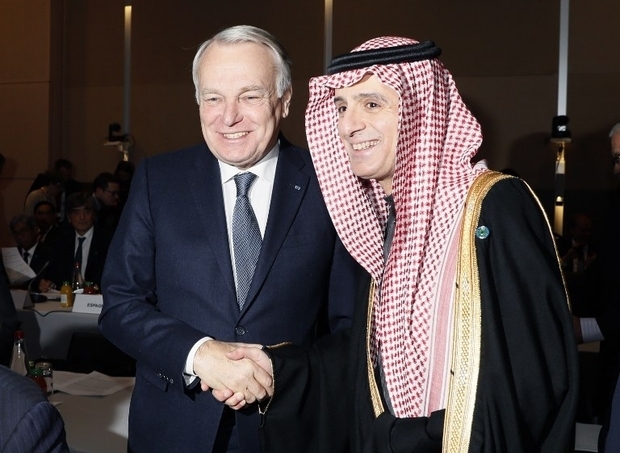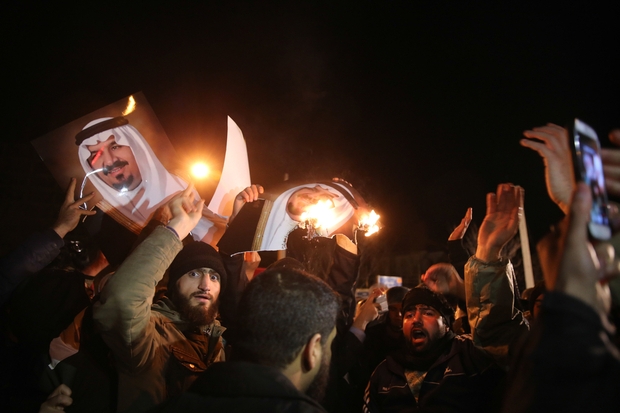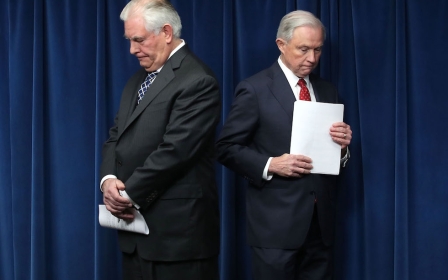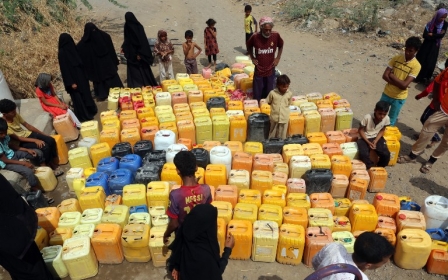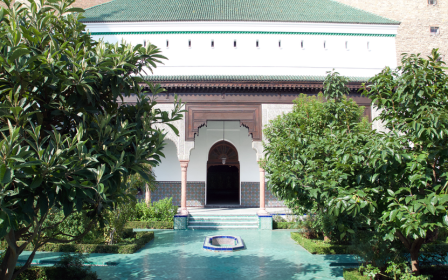France turning blind eye to Saudi's dangerous power games, says Conesa
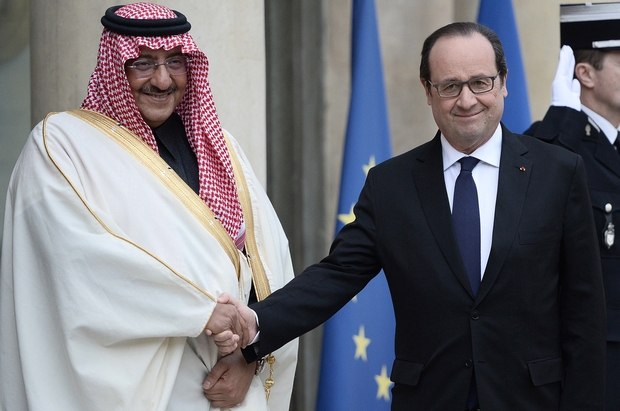
Pierre Conesa's new book on Saudi's soft power projection opens with a quote from Richard Holbrooke, former US ambassador to the UN, that sets the tone for what follows: “The Saudis exported their problems by funding the schools, the madrassas, all over the Islamic world.”
In Doctor Saoud and Mister Jihad (Robert Laffont, 2016, preface by Hubert Védrine), Conesa, co-president of the Observatoire des radicalisations (Radicalisation Observatory), takes a detailed look at this particular Saudi “export” and its impact on the region.
In this thoroughly researched book, which won the 2017 Axyntis-Conflits Prize for Strategic Analysis, Conesa deconstructs Saudi Arabia’s soft power, which is as much a projection of strength as it is a survival strategy for a monarchy struggling to keep the lid on rising domestic dissent and faced with ever-shifting regional rivalries for the domination of the Arab-Muslim world, be it with Egypt, Pan-Arabism or Shia Iran.
Conesa analyses the mechanisms of the soft religious power used by Saudi Arabia for exporting Wahhabism abroad. He explains that this particular blend of religion and politics was imprinted in the genetic make-up of the kingdom - beginning in Nejd, in 1744, when a tribal chief, Muhammad bin Saud, and a religious leader, Mohammad ibn Abd al-Wahhab, joined forces to establish a kingdom – born of the sword and the Salaf (“ancestors” in Arabic, designating the first three generations of Muslims).
Conesa explains that the monarchy’s particular form of tribal-religious soft power, serving a patrimonial kingdom considered the legitimate heritage of the royal family of Saud, is built around a carefully engineered campaign for promoting Saudi interests abroad. Saudi-backed organisations include the Muslim World League (MWL), founded in response to Nasserist pan-Arabism, which finances the construction of mosques around the world; the Islamic University of Medina, which provides scholarships, accommodations and living expenses to Muslim theology students, including foreigners, who subsequently spread Saudi religious doctrine in their native countries; and the Organisation of Islamic Cooperation (OIC), “a permanent inter-state structure called for by Riyadh,” with 57 member states, providing “a platform for exchange and the elaboration of common diplomatic policies”.
A former senior civil servant at the Department of Defence, Conesa also takes an uncompromising look at France’s diplomatic overtures toward the Gulf state monarchy which, under President François Hollande, has become a key economic partner.
Middle East Eye: Why isn’t the question of the religious diplomacy of Saudi Arabia being addressed in France?
Pierre Conesa: The religious underpinnings of Saudi diplomacy are a subject of intense debate in the Arab world, as they are in the United States. In France, however, they are virtually non-existent. It is as if a form of sociological resistance were preventing the analysis of Saudi politics. The Quai d’Orsay (French foreign office) has made some inflammatory remarks about my book, accusing me of “Saudiphobia”. But Hubert Védrine’s preface pretty much sums it up: the question of diplomacy for achieving religious ends needs to be addressed.
The truth behind the French government’s hesitation lies in the potential “tens of billions of dollars” in contracts that Saudi Arabia has been promising for years
That is not to say it is a problem specific to Saudi Arabia. The Vatican, US neo-Evangelical movements, the Jewish Defence League, and the religious agendas of both Qatar and Turkey under Erdoğan could also be named. But Saudi Salafism is the only form of religious radicalism that is consistently promoted and funded with public money and state-controlled national resources.
The truth behind the French government’s hesitation lies in the potential “tens of billions of dollars” in contracts that Saudi Arabia has been promising for years. Saudi society is fundamentally fractured and Riyadh has been France’s number one defence industry client for over 30 years. When the Saudis buy weapons, they are buying peace of mind – anxiolytics provided by France and guaranteeing security and defence. The relationship is perverse.
The Saudi system of religious diplomacy has been in the works for years, however, without anyone really paying attention to it or even caring. Yet on closer inspection, the system is particularly ingenious owing to its hybrid nature: it packs the hard punch of American-style ready money with the effectiveness of Soviet-era methods. It’s the bastard child of American soft power and Soviet propaganda.
MEE: How would you define Saudi Arabia’s soft religious power?
PC: What is interesting about Saudi soft power is that it’s not just a projection of power. It’s not hard power. It is another kind of power. The image we project is what allows us to build up a store of soft power: “France and the Declaration of Human Rights,” “Israel and the Shoah”... Projected image is an important aspect of international relations.
The Saudi monarchy, from its very creation, had an objective mission – to spread the Wahhabi, or Salafi, version of Islam. The Wahhabis call themselves “Salafis” to avoid referring to the preacher Mohammad ibn Abd al-Wahhab, a reference that would elevate him to the status of “intermediary” between God and the Muslims.
Saudi Arabia packs the hard punch of American-style ready money with the effectiveness of Soviet era methods
From the founding of the kingdom in 1932 and up until 1973, the country was a geopolitical dwarf. Why would anyone worry about the Saudis? The country’s anti-Nasserist policies were seen as a good thing in the West. When Afghanistan was invaded, the West did not realise that Saudi Arabia was pursuing its own diplomatic agenda. At the time, reports on Saudi money funding Islamists and extremist Afghan fighters (Sayyaf and Hekmatyar, among others) were simply ignored.
xWhen Saudi Arabia negotiated with General Muhammad Zia-ul-Haq [Pakistan’s chief of army staff who deposed President Zulfikar Ali Bhutto in a military coup in 1977 and who served as president of Pakistan from 1978 until his death in 1988], it led to the establishment of madrassas for Afghan refugees, the schools from which the Taliban would emerge 15 years later. But again, we were either unable or unwilling to recognise this at the time. After postulating on the religious basis of Saudi diplomatic policy, it was a matter of understanding its mechanisms.
Why has Saudi Arabia been so successful internationally? Money, of course, is a factor, but not the only one. Let us not forget that Saudi diplomacy first emerged in response to, and even as the reverse image of, Nasser’s Egypt. On one side, the pan-Islamism of Saudi Arabia, on the other, the pan-Arabism of Egypt: the Islamic University of Medina in opposition to Al-Azhar University, the Muslim World League to counter the Arab League. This Saudi opposition to Nasserism fitted the Westerners’ vision and the East-West divide. And again, Saudi Arabia was regarded as a political lightweight governed by a bunch of big children.
MEE: How did Saudi Arabia build up its soft power?
PC: There are different historical periods. Saudi opposition to Nasser’s Egypt ended in 1973, Nasserist socialism, in the aftermath of the Yom Kippur War of 1973, disappeared from the political arena. But 1973 also marked the start of the oil crisis that would miraculously turn Saudi Arabia into a cash cow for industrialists around the world: Saudis could pay for anything – up front, in hard cash.
Then in 1979 started a new period, with a number of Saudi problems emerging. Regionally, with the Islamic Revolution in Tehran and the overthrow of the Shah of Iran – who had never played the Shia political card nor tried to stir discontent among Saudi Shia. Domestically, with the occupation of the Great Mosque of Mecca by a group of religious radicals protesting the country’s accelerated modernisation, and internationally, with the Soviet invasion of Afghanistan.
When the Saudis buy weapons, they are buying peace of mind – anxiolytics provided by France.
All of sudden, the divisions on the domestic level appear, as well as the Shia threat and the idea that Shias are coming back in history and that Iran is using the voice of revolutionary Islam. The conflict in Afghanistan was thus an opportunity for Saudi Arabia to export its most radical nationals to the war, while building up significant goodwill with Western powers which, thereafter, saw Saudi Arabia as a regional ally.
This all took place within the framework of a world divided along East-West lines. Yet as I mentioned earlier, Riyadh had its own strategic agenda, namely vis-à-vis Pakistan, which was one of its closest political allies. It should also be noted that Saudi Arabia didn’t need nuclear weapons because Pakistan’s nuclear capacity was seen as “an Islamic bomb”.
Another critical juncture came in 1989 with the end of the binary East-West axis. Prior to this date, both of the world’s superpowers were inevitably drawn into crises of every stripe, each fearing the other would gain the upper hand should they not take action. The geopolitical cards having since been reshuffled; nations today are defined along lines of useful or useless, with regards to the interests of Western powers, that is. Nobody was overly concerned by the Second Congo War, the deadliest conflict the world has seen since World War II.
MEE: How do you explain the animosity between Iran and Saudi Arabia?
PC: Given the religious nature of the Iranian revolution, Khomeini quickly made a number of religious claims, including the joint management of Muslim holy places. Relations between the two countries have been centred on religious questions since 1979. It is a faceoff between two theocracies. Iran sees itself as the only credible geopolitical actor in the region. Iraq and Syria are imploding. Saudi Arabia does not have the human resources to match its ambition. Remember that many of Saudi Arabia’s first civil servants were Muslim Brotherhood leaders who had fled persecution under Nasser in the 1960s.
MEE: You’ve mentioned that the Muslim world, and in particular Morocco and Algeria, is particularly alarmed by the religious agenda of Saudi diplomacy. Why?
PC: Algeria refused to join the anti-terrorist coalition created by Riyadh, allegedly because it refused to make an alliance with a country linked to the terrible years of the dirty war [Saudi Arabia is accused of having favoured Islamism during the Algerian Civil War of 1991-2002]. As for Morocco, it is a question of religious legitimacy, relative to the royal family. The Moroccan monarchy is the only one able to claim descent from the Prophet Mohammed. That is the Saudi monarchy’s weak point, that it cannot make such a claim.
Morocco develops a religious diplomacy and trains imams in a number of African countries, within the Makelite doctrine. The aim is to counter the Saudi influence, which is even stronger in poor countries. In these countries, Saudi Arabia has set up madrassas to attract the best students, who then go on to study in Medina before being sent back home. This gives it a strong ability to influence.
The issue of Shiism is central to Saudi efforts. It comes down to a question of countering Shia influence. This is the one constant feature of Saudi religious diplomacy today.
MEE: How do you explain the social resistance of France, which prevents it, in your opinion, from understanding the religious underpinnings of Saudi diplomacy?
PC: French society has a complicated relationship to Islam. Consequently, any critical assessment of Islam, and of Saudi Arabia in particular, is seen as an Islamophobic argument. Yet this country is a caricature of Islam, the “North Korea of Islam”. Everything there is fake, without faith. There is no real spiritual debate.
This country is the 'North Korea of Islam'. Everything there is fake, without faith. There is no real spiritual debate
But we have to be careful because it’s an enormous market for the French defence industry – the much-vaunted “10 billion in contracts”. Hubert Védrine also said in his preface that France’s vision of the secular state is a hurdle to understanding the religious underpinnings of Saudi diplomacy. This is why Alain Juppé closed the bureau of religious affairs at Quai d’Orsay [French Ministry of Foreign Affairs] that had been put into place by his predecessor.
Saudi Arabia recently signed four contracts with PR firms, including Publicis, Havas and Image 7. It knows it needs to better its reputation in France. The monarchy is very careful about the image it projects. Economic and political clout can only be gained at the highest levels of governments. In the United States, for example, Riyadh has financed foundations and endowed university chairs. It has also created a media group, but all through third parties and non-government organisations. It is a strategy of influence, not one of presence.
France is incapable of taking into account the religious realities of diplomatic relations. It hasn’t been able to understand the Taliban, the Algerian GIA (Armed Islamic Group) and Islamic State through a global point of view. Same with the upsurge of revolutionary Shiism and Hezbollah’s ability to stand up to Israel. These are the weak spots of French strategic analysis.
François Fillon is the only one who has spoken out on the issue of Saudi Arabia. French political circles are only just starting to realise that the Franco-Saudi relationship is not only perverse, it is contrary to French interests given actions of graduates of the Islamic University of Medina in Mali and the countries of the Sahel and Western Africa.
For thirty years Medina graduates have been making a power grab in the region. To me, this is clearly a key factor in the Malian crisis. And the Malian model is highly exportable, to places like Central African Republic and Niger.
MEE: Is Saudi Arabia trying to influence the Muslim community of France?
PC: There is a process of silent integration in France. The rise of Salafism has clouded our vision of how French society has changed. France’s Muslim elite sounded the alarm on the surge of Salafism in France well before the politicians did. But French Muslims today are particularly hard hit by social issues. Salafism promotes an ideology of rupture, with a message of social justice taking up the discourse of the far left. Though it has only won over a tiny portion of the French Muslim community, it dominates the media.
Though Salafism has only won over a tiny portion of the French Muslim community, it dominates the media
Saudi Arabia’s diplomatic policy towards western countries consists of distinguishing between countries that are communitarian and those that are secular. In countries governed by principles of community rights, such as Canada, the strategy is to demand that Muslims be treated on equal footing with other national communities. Muslim communities can therefore claim the creation of religious schools (madrassas) and Sharia courts. And they can petition, of course, to participate in the representative bodies of Islam.
When the Muslim World League applied for a seat at the French Council of Muslim Worship, the request was turned down by the then minister of the interior, Charles Pasqua. In secular countries like France, the strategy of the MWL is to denounce Islamophobia.
New MEE newsletter: Jerusalem Dispatch
Sign up to get the latest insights and analysis on Israel-Palestine, alongside Turkey Unpacked and other MEE newsletters
Middle East Eye delivers independent and unrivalled coverage and analysis of the Middle East, North Africa and beyond. To learn more about republishing this content and the associated fees, please fill out this form. More about MEE can be found here.


